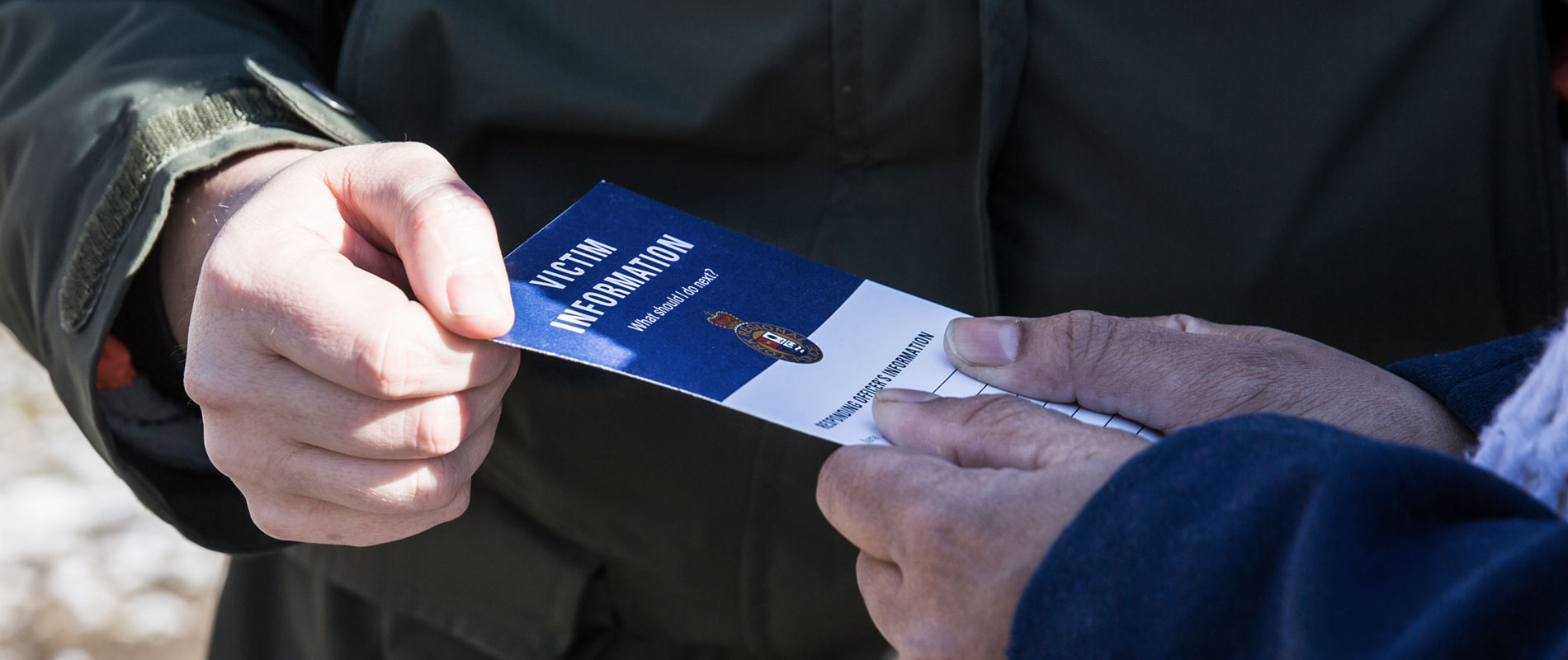VSY works collaboratively with many agencies to create a seamless approach to victim’s issues. Some of these agencies are listed under links and organizations. One of the cornerstones of providing good client service is the systematic and consistent connection of a person requesting services to the appropriate resource for continuum of services.

Resource links
Responses to Trauma
Understand the stages, impact, and reactions when a person is responding to trauma.
Impact Stage:
- Shock
- Overwhelmed
- Helpless
- Numb – disconnected from body
- Immobilized
- Denial
Degree of impact depends on:
Stress Management Skills: The stress management skills of the client may effect how they respond to crisis. If they do not handle stress well, the client could become overtly emotionally and physically distraught.
External Stress Factors: External stress factors may influence the degree of impact on a person. For instance, the more additional stress one has in their life can directly affect an individual emotionally and/or physically (i.e. got divorced a month ago, lost their job 2 weeks ago and is now dealing with being assaulted).
Reactions to Trauma / Crisis may include:
Physical:
- Sleep Disturbances
- Fatigue
- Eating Disturbances
- Chills
- Headaches
- Tension
- Shakiness
- Jumpy
- Chest Pain
- Skin Disorders
Emotional:
- Numbness
- Crying
- Anxiety
- Fear
- Nervousness
- Confusion
Cognitive:
- Recurrence
- Seeing Images
- Unfocused
- Forgetful
Behavioural:
- Taking Extra Safety Measures
- Doing Nothing
- Keeping Busy
- Staying Away From Scene
- Not Wanting To Separate From Friends And Family
Recurrence Stage:
- Rollercoaster of Emotions
- Irritability, Hyper, Alertness
- Trigger Events, Sights, Sounds
Extra Safety Precautions
Cope As An Individual
Learn how to deal with tragedy personally, physically, and psychologically.
Personally
- Honour the increased need to monitor safety for self and others’ – your world view has changed by what you’ve experienced
- Strengthen “outside” life – enlarge personal world through friendships, family relationships, interests and activities
- Develop individual personal coping strategies: physical exercise/workouts, hobbies, sports, quiet time, leisure activities (walking, canoeing, gardening, music)
- Choose activities that do not remind you of the trauma/ crisis: non-violent movies, time-out from news reports/newspapers, friends who are not in the same field
- Create a non-abuse/violence-free space
- Take breaks!!!
- Learn not to take on the issues of others
- Learn to say “NO” – know your limits – know when you need a break/downtime
- Develop outside supports
- Balance time for work/family/self
- Spend time with “Nature” – even pets are known to be stress-reducers
- Have some FUN – use humour/laugh
Physically
- Listen to your body – pay attention to muscle tension, headaches, stomach distress, sleeping/eating/drinking patterns
- Release body tension – stress creates an adrenaline response and most of our stress does not require physical activity (flight or fight), therefore it is necessary to release muscle tension for the body to return to normal: run relaxation exercises, tai chi, yoga, etc.
- Good nutrition, especially when you are particularly stressed
- Rest/sleep
Psychologically/Emotionally/Spiritually
- Make efforts to label what you are experiencing and how it is affecting you – gnawing sensations and tension need to be examined for what they are trying to tell us. Naming the anger, sadness, cynicism, helplessness, the tragedy/atrocities, the frustrations, helps us in beginning to deal with our experience
- Re-establish hope – identify the “positives” in your life
- Establish areas of control in your life (not in relationships however!)
- Consciously work on your own self esteem/self image/self worth
Funders & Resources
We connect people to the resources that best meet their needs.
Funders
Resources
- Addiction Services of York Region
- COSTI Family & Mental Health Services
- Crown Attorney’s Office
- Family Law Education for Women
- Family Services York Region
- Jewish Family & Child Services
- Krasman Centre
- Multi-lingual Comm. Interpreter Services
- Sandgate Women’s Shelter
- Victims Services of York Region
- Victim Witness Assistance Program
- Women’s Centre of York Region
- Women’s Support Network
- Yellow Brick House
- York Catholic District School Board
- York Central Hospital
- Domestic Abuse & Sexual Assault Centre
- York Region Children’s Aid Society
- York Region Abuse Program
- York Region Health Services
- York R. LGBT Comm.Outreach Program
- York Region Neighborhood Services
- York Region Police
- York Support Services Network
Useful Links
External links to services on getting help such as Children’s Aid, legal services and financial assistance.
Alcohol, Drug and Other Addictions
Children and Family Sites
- Association of Parent Support Groups in Ontario Inc.
- Big Brothers, Big Sisters of York
- Child and Adolescent Crisis Program
- Children’s Aid Society of York Region
- Chinese Family Services of Ontario
- Family Services York Region – Youth in Transition Line
- Health Services of York Region – Sexual Health Clinic
- Hospice Markham-Stouffville (Evergreen)
- Kinark Child and Family Services
- Korean For You Telecare Family Services
- New Path Youth and Family Counselling
- Pathways for Children
- PFLAG (Parents and Friends of Lesbians and Gays) York Region
- Pregnancy Centre
- Rainbows Inc.
- Rose of Sharon
- Sandgate Women’s Shelter
- S.E.A.S. Centre
- Social Services Network
- Supervised Access Centre
- Toronto Chinese Community Services Association
- Yellow Brick House
- York Centre for Children, Youth and Families
- York Region Abuse Program
Counselling
- Canadian Mental Health Association
- Catholic Community Services of York Region, CCSYR
- Child and Adolescent Crisis Program, South Lake Regional Health Centre
- Chinese Family Services of Ontario
- COSTI-IIAS-Family Counselling Services
- Family Services York Region
- Japanese Social Services
- Kinark Child and Family Services
- Korean For You Telecare Family Services
- Muslim Welfare Centre
- Oasis – Centre Des Femmes
- Parents for Youth-York Region
- Sandgate Women’s Shelter
- S.E.A.S. Centre
- Social Services Network
- Toronto Chinese Community Services Association
- Women’s Centre of York Region
- Women’s Support Network
- Yellow Brick House
- York Centre for Children, Youth and Families
Court and Legal Services
- Community Legal Clinic of York Region
- Court House – Criminal/Youth, Newmarket
- Crown Attorney’s Office
- Family Court
- Family Law Information Centre
- Family Responsibility Office
- Justice for Children and Youth
- Justice of the Peace (J.P.)
- Lawyer Referral Services
- Legal Aid Ontario
- Legal Line
- Ontario Rental Housing Tribunal
- Probation and Parole Offices
- Sandgate Women’s Shelter
- South Asian Legal Clinic of Ontario
- Victim Information Line, National Parole Board
- Victim Support Line, Ontario Parole Board
- Victim Witness Assistance Program (VWAP)
- Yellow Brick House
- York Region Abuse Program (YRAP)
Domestic Violence
Emergency Needs
- Crosslands Church, King George School
- Krasman Centre
- Neighbourlink, Heart of York
- Newmarket Soup Kitchen
- Northridge Church – Newmarket
- Pathways for Children
- Red Cross (Canadian), Region of York Branch
- Sandgate Women’s Shelter
- Unionville Alliance Church
- Yellow Brick House
- York Region Food Network
- York Region Street Outreach
Employment Assistance
Financial Assistance
- Aids Committee of York Region
- Criminal Injuries Compensation Board
- Community Credit Counselling Services
- December 6th Fund of Toronto
- Family Responsibility Office (FRO)
- Family Services York Region
- Markham Credit Counselling
- Ontario Disability Support Program (ODSP)
- Share the Warmth
- Social Services Department, Region of York
- Social Services Network (South Asian Services)
Government
Grief and Bereavement
- Basic Funeral Services
- Benjamin’s Park Memorial Chapel
- Bereaved Families of Ontario – York Region
- Bereaved Jewish Families of Ontario
- Chapel Ridge Funeral Home
- Canadian Foundation for the Study of Sudden Infant Death Syndrome
- Carefirst Seniors and Community Services Association
- Casey House Hospice
- Highland Funeral Home
- Hospice Georgina
- Hospice Markham-Stouffville
- Humphrey Funeral Home
- Jewish Hospice Program, Bereaved Jewish Families of Ontario
- Lathangue and Skwarchuk Funeral Home
- MADD, Mothers Against Drunk Drivers
- Marshall Funeral Home Inc.
- Ogden Funeral Homes
- O’Neil Funeral Home
- Perinatal Bereavement Services Ontario
- Rainbows Inc.
- Roadhouse and Rose
- R.S. Kane Funeral Homes
- Seasons for Grieving/Traumatized Children
- Steeles Memorial Chapel
- Suicide/Homicide Survivor Support Program
- The Simple Alternative
- Taylor Funeral Home and Cremation Centre
Health
Housing
Law Enforcement
Mental Health
Multicutural/Immigration
- Bereaved Families of Ontario – York Region
- Carefirst Seniors and Community Services Association
- Catholic Community Services of York Region, CCSYR
- Chinese Family Services of Ontario
- COSTI-IIAS-Family Counselling Services
- Delisle Youth Services
- Family Services York Region
- Hong Fook Mental Health Association
- Japanese Social Services (Japanese Canadian Cultural Centre)
- Jewish Family and Child Services of York Region
- Korean Canadian Women’s Association
- Korean For You Telecare Family Services
- Krasman Centre
- Lesbian/Gay/Bisexual/Transgendered (LGBT) Youthline
- Muslim Welfare Centres
- Muslim Welfare Centres (continued)
- Oasis – Centre Des Femmes
- PFLAG (Parents and Friends of Lesbians and Gays) York Region
- Social Services Network (South Asian Services)
- South Asian Legal Clinic of Ontario
- Toronto Chinese Community Services Association
- Women’s Centre of York Region
- Yee Hong Centre for Geriatric Care
- Against Women Coordinating Committee
Safety
Senior Citizens
Sexual Assault
Victim Assistance
- Algoma District VCARS
- Caledon-Dufferin Victim Services
- C.C.A.R.E.S. Victim Assistance
- Manitoulin-North Shore VCARS
- Muskoka Victim Services and Support Link
- North Simcoe Victim Crisis Services
- Peterborough/Northumberland Victim Services, Support Link
- Renfrew County VCARS (East Region)
- Thunder Bay and Area Victim Services
- VCARS of Windsor and Essex
- Victim Assistance Services of Oxford County
- Victim Services of Brant
- Victim Services of Bruce Grey and Owen Sound
- Victim Services of >Huron County
- Victim Services of Middlesex County
- Victim Services of Peel
- Victim Services of Perth County
- Victim Service of Sarnia-Lambton
- Victim Services Program of Toronto Inc.
- Victim Services of Waterloo Region
- Victim Services of Wellington
- Victim Services of York Region Inc.
- Victim Information Line, National Parole Board
- Victim Support Line, Ontario Parole Board
- Victim Witness Assistance Program (VWAP)


